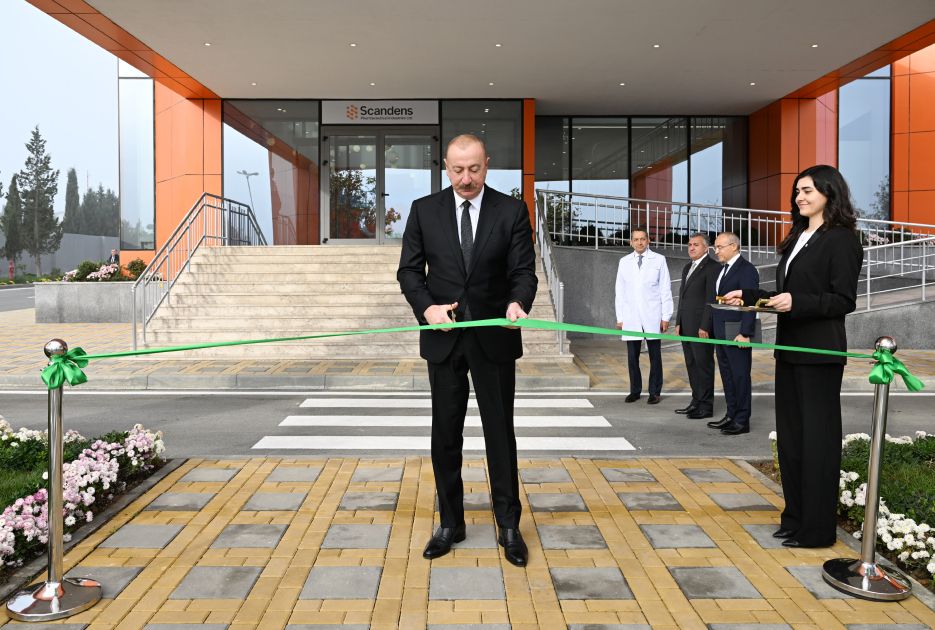Azerbaijan steps up pharma ambitions with opening of state-backed Scandens factory

Azerbaijan is pushing forward on multiple fronts of non-oil economic diversification, and its pharmaceutical sector is increasingly emerging as a key pillar. Specifically, starting from next year, the government aims for a strong, radical, and long-awaited shift from oil and gas dependence. The inauguration of a major production facility by Scandens Pharmaceutical Industries Ltd. in the Absheron district signifies more than just a business expansion. It represents a strategic bet on the country’s future as a regional pharmaceutical hub.

On November 22, 2025, President Ilham Aliyev officially opened the Scandens plant in Hokmali, Absheron, accompanied by Economy Minister Mikayil Jabbarov and Scandens CEO Kamran Hasanov.
The facility, built to international standards with equipment from Germany, Switzerland, and Italy, is designed to manufacture approximately 800 million tablets and capsules per year across a wide range of therapeutic areas — including antibiotics, diabetology, hepatology, cardiology, allergology, gastroenterology, and more.
Backed by private investment worth 74 million manats, the project also benefited from government support: under an investment promotion document, Scandens received 6.5 million manats in concessions for imported equipment.
In USD terms, 74 million manats is roughly US$43.7 million, and 6.5 million manats is about US$3.6 million.
The plant currently employs 120 staff.
Scandens is not just another assembly-line factory. According to its own site, the company is the first in Azerbaijan to support a full production cycle of solid oral dosage forms (tablets, capsules, granules), backed by a full quality-control lab.
Beyond the initial 800 million-unit capacity, Scandens has projects to expand production of ointments, suppositories, and even sterile products (ampoules, infusions).
This means that all stages — from raw material processing to finished drug — will increasingly be done domestically, reducing dependency on imports and potentially improving access for local patients.
The new plant is also designed as a training hub. Under a four-party Memorandum, Scandens is partnering with Azerbaijan Medical University, Hungary’s University of Pécs, and Pannon Pharma to run internship and training programs for both pharmaceutical and non-pharmaceutical professions.
On the sustainability front, Scandens has installed 710 solar panels on its roof with a combined capacity of 450 kW, which allows the facility to satisfy about 40 percent of its energy needs from renewable sources. The company also emphasizes environmental responsibility, treating its industrial waste on-site and aiming for zero liquid discharge.
Scandens’ story comes at a pivotal moment for Azerbaijan’s pharmaceutical industry. Domestic output is growing quickly. In 2025, the sector reported 81.5 percent growth.
Historically, the country has relied heavily on imports. According to a World Bank report, imports made up about 60 percent of the domestic drug market, and informal/unregulated markets were sizable.
In 2025, pharmaceutical imports continued to rise. From January to February, Azerbaijan imported US $90.63 million worth of medicines, 14.3 percent more than in the same period of 2024. This underscores how critical it is for domestic production to scale, both for health security and economic resilience.
The Scandens plant is part of a broader push to embed pharmaceuticals within Azerbaijan’s non-oil industrial strategy. The Pirallahi Industrial Park, for example, is explicitly specialized in pharmaceuticals. This industrial park hosts companies that manufacture medicines jointly with foreign partners, helping to transfer technology and scale up local capabilities.
Over the decades, Azerbaijan has aimed to reduce its dependency on imported medicines. As early as 2015, officials noted that up to 97 percent of medicines were imported. Today’s advances suggest real progress on that front.
What this means for export potential and economic diversification?
Strengthening local pharmaceutical capacity isn’t just about health; it’s also about trade. By producing at scale with international-grade quality, Azerbaijan could begin to export medicines to neighboring markets and beyond.
Already, Scandens is talking about exports alongside domestic supply. Meanwhile, the government’s support for high-quality production and investment is aligned with broader diversification goals, including boosting non-oil exports.
The development of Scandens and the wider pharmaceutical sector fits neatly into Azerbaijan’s long-term economic vision. By investing in high-technology production, the country reduces its vulnerability to external shocks in medicine imports and taps into global demand for generic and specialty drugs.
Moreover, the facility’s environmental footprint (with solar power and waste recycling) aligns with global sustainability trends and helps build Azerbaijan’s reputation as a responsible industrial actor.
Here we are to serve you with news right now. It does not cost much, but worth your attention.
Choose to support open, independent, quality journalism and subscribe on a monthly basis.
By subscribing to our online newspaper, you can have full digital access to all news, analysis, and much more.
You can also follow AzerNEWS on Twitter @AzerNewsAz or Facebook @AzerNewsNewspaper
Thank you!

